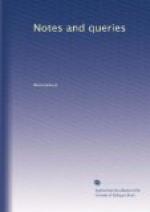My own impression is, that the common use of hemp in the East, for intoxicating purposes, from a very early period, has been the cause of much of the misconception which prevails with regard to the supposed ante-European employment of “tobacco, divine, rare, super-excellent tobacco,” in the climes of the East.
J.M.B.
* * * * *
“JOB’S LUCK,” BY COLERIDGE.
These lines (see Vol. ii., p. 102.) are printed in the collected editions of the poems of Coleridge. In an edition now before me, 3 vols. 12mo., Pickering, 1836, they occur at vol. ii. p. 147. As printed in that place, there is one very pointed deviation from the copy derived by Mr. Singer from the Crypt. The last line of the first stanza runs thus:
“And the sly devil did not take his spouse.”
In the Gentleman’s Magazine for February, 1848, there is a poem by Coleridge, entitled “The Volunteer Stripling,” which I do not find in the collected edition above mentioned. It was contributed to the Bath Herald, probably in 1803; and stands there with “S.T. Coleridge” appended in full. The first stanza runs thus:
“Yes, noble old warrior! this heart
has beat high,
When you told of the deeds which our countrymen
wrought;
O, lend me the sabre that hung by thy
thigh,
And I too will fight as my forefathers
fought.”
I remember to have read the following version of the epigram descriptive of the character of the world some twenty or thirty years ago; but where, I have forgotten. It seems to me to be a better text than either of those given by your correspondents:
“Oh, what a glorious world we live
in,
To lend, to spend, or e’en to give
in;
But to borrow, to beg, or to come at one’s
own,
’Tis the very worst world that ever
was known.”
J. Bruce.
* * * * *
ECCIUS DEDOLATUS.
Mr. S.W. Singer, for an agreeable introduction to whom I am indebted to “Notes and Queries,” having expressed a wish (Vol. ii., {157} p. 122.) “to see and peruse” the rare and amusing satire, entitled Eccius dedolatus, authore Joanne-francisco Cottalembergio, Poeta Laureato, I shall willingly forward to him a quarto volume which contains two copies of it, at any time that an opportunity may present itself. In the meanwhile, he may not have any objection to hear that these are copies of distinct impressions; neither of them intentionally recording place or printer.
Four separate and curious woodcuts decorate the title-page of one exemplar, which was certainly printed at Basil, apud Andream Cratandrum. The topmost woodcut, dated 1519, is here misplaced; for it should be at the bottom of the page, in which position it appears when employed to grace the title of the facetious Responsio of Simon Hess to Luther. The second copy is in Gothic letter, and has typographical




